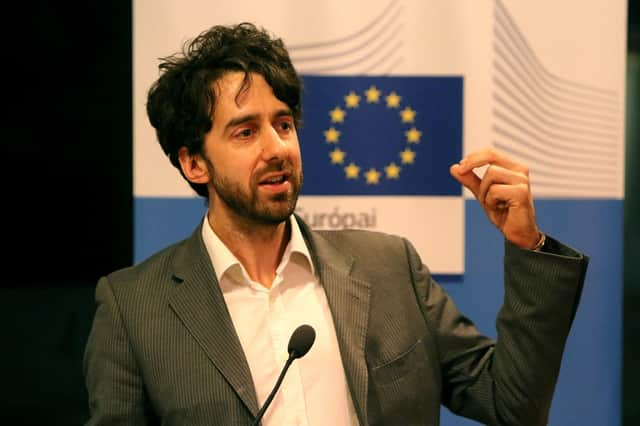Doing Data Better: Pandemic became game changer for online safety


A new relationship between human beings and their personal data is needed after the pandemic “turbo-charged concerns about our reliance on technology”, a virtual conference hosted by The Scotsman heard last Thursday.
Jamie Bartlett, an author and broadcaster on technology issues, told the online audience that we should “re-set” our relationship with big tech firms after a huge acceleration in our use of online platforms.
Advertisement
Hide AdAdvertisement
Hide AdHe told The Scotsman’s Doing Data Better event that he was "very nervous” about giving all his data to the likes of Amazon before the pandemic, but added: “Any of my ethical considerations to do with using one or two very large online commerce companies flew out the window because I needed toilet paper, and I needed it from Amazon Prime immediately.”
The explosion of digital technology was a huge positive during the pandemic, Bartlett said, asking: “Where would we have been without the amazing ability to keep us connected? It really worked, not to mention of course, how important data was in trying to work out the spread of the virus.”
But, he added: “This turbo-charged some of the deeper concerns that many of us – me included – had about our reliance on certain types of technology, and the production of data through that technology.”
Bartlett went on to observe that the pandemic had deepened the divide between our “analogue democracy, institutions and laws, and our digital technology, which doesn’t follow the same norms logic, or patterns.
“Part of the job of societies is to keep the analogue and digital close together, or at least minimise the gap,” he continued. “Suddenly we’ve zoomed ahead for five or seven years [in terms of tech], but without the time to catch up.”
Another big data question was the “blurring of boundaries between work and home”, said Bartlett. He explained: “For a long time, I’ve noticed a very worrying trend. It’s that we have a work email, and we sometimes use it to sign in or create accounts with things that have nothing to do with work.
“That’s a real problem, and I see stolen data turning up on the dark net.
“Maybe people’s work systems are extremely secure, but then they go on to a gaming site and use exactly the same work email/password combination. Six months later, the gaming site, which has very bad internet security, is hacked into. Two months later, that work email and username/password combination is for sale on a darknet marketplace. You can then be bought. It’s not just access into the gaming site, it’s access into your work system, which is much more serious. That blurring is extremely risky.
Advertisement
Hide AdAdvertisement
Hide Ad“There is an important lesson for everyone who’s going online more to learn the basics. Even at an individual level, each of us could help our friends and family, with real basics on data security.”
Bartlett said a longer-term reset involved understanding the right to the “portability” of data. “All of us have the right to ask companies to tell us what data they have and even give the data back if we so demand. As more of us head online and more and more data is produced, I think that right becomes very important.”
He suggested consumers cold come together, maybe via intermediary companies.
“We want a million consumers to all give us permission to go to every single company, find out the data they have, and then sell that directly to advertisers and share that equitably between all of you as you wish.
“This would be transformational. Suddenly people would understand the data exchange and the value that it can bring, but it requires coordination from citizens, and also new companies and new business models. I’d like governments to try to incentivize people to make better use of their data.”
Jarmo Eskelinen, executive director of the Data-Driven Innovation initiative, said we were still in an emerging state of finding real trust in how our data is used.“We need a third model to trust data, as opposed to corporate revenues models or more worryingly, oppressive government-driven models coming from China. We need a data environment which strikes a balance between privacy and public good.”
Eskelinen also talked about the importance of data repositories, shortly after the Scottish Government officially launched Research Data Scotland (RDS), to give researchers access to more and better data to deliver for public good.
Roger Halliday, Scotland’s Chief Statistician, described RDS as “a service for researchers to help data-driven innovation happen across Scotland and to improve decision-making, save time, money and lives.”
Advertisement
Hide AdAdvertisement
Hide AdHe told the event “trust is at the heart of everything we do” and said that RDS was based on the “five safe” principles – safe data, safe settings, safe people, safe projects and safe outcomes”.
Economist and author Allison Schrager said data had to have a current relevance to be useful, and to minimise risk, and warned against using data that was too historic.
Four panel discussions looked at how doing data better can support the fight against climate change, efforts to predict future pandemics, rebuilding the economy after Covid-19 and tackling financial exclusion.
In one session, Dr Murray Collins, a specialist in space satellite data, stressed the need to draw meaningful insights from very large amounts of data, saying: “We are drowning in data for want of information.”
Read much more about the conference in a pull-out special report in Thursday’s edition of The Scotsman.